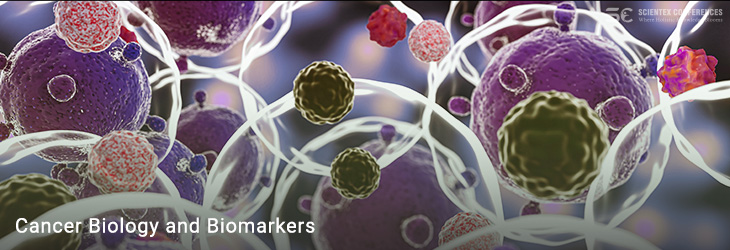Track: Cancer Biology and Biomarkers

The development of effective treatments and methods for diagnosis depends on an understanding of the biology of cancer. The session on Cancer Biology and Biomarkers offers a deep dive into how normal cells undergo malignant transformation and how biomarkers can provide crucial insights into cancer detection and treatment and provide an experience designed for researchers, clinicians, and students eager to deepen their understanding of cancer biology and the emerging role of biomarkers in diagnosis and therapy.
Session Highlights:
Session Highlights:
Cancer Biology: Explore the molecular and cellular mechanisms that drive the transition of normal cells into cancerous ones. This session will discuss how disruptions in a cell’s intracellular network lead to carcinogenesis, tumor growth, and metastatic progression. It is essential to understand these mechanisms in order to create novel cancer treatments and prognostic models.
Role of Biomarkers in Cancer: Biomarkers are biological indicators that can reveal crucial information about cancer's presence, type, and progression. This session will focus on the growing role of biomarkers in precision oncology, where treatment is tailored to individual patient records based on biomarker data.
Key Topics Covered:
Tumor Testing and Biomarkers: Find out how important it is to find specific biomarkers in tumors so that individualized treatment plans may be developed.
Tumor Genetic Testing: Discover how analyzing genetic mutations in cancer cells provides insights into tumor behavior and guides targeted therapies.
Genomic Testing and Profiling: Recognise the significance of examining the genetic makeup of cancer cells in order to spot trends that may affect prognosis and treatment.
Molecular Testing and Profiling: Explore how specific molecular changes are used to diagnose and manage different cancer types.
Liquid Biopsies: Get insights into this innovative, non-invasive method that detects cancer markers in body fluids like blood, enabling real-time monitoring of disease progression.
Tumorigenesis: Delve into the process by which normal cells evolve into cancer cells and form tumors.
Malignant Progression: Examine the stages through which cancer becomes more aggressive and spreads to other parts of the body.
Scientific Highlights
- Cancer Research Therapy and Autoimmune Diseases
- Cancer Biology and Biomarkers
- Types and Causes of Cancer
- Hematology in Cancer
- Organ Specific Cancer
- Cancer: Awareness, Lifestyle and Nutrition
- Oncology Subspecialties
- Advancements in Cancer Imaging Technologies
- Cancer Genomics and Epidemiology
- Cancer and Immunology
- Tumor Pathology and Cancer Cytopathology
- Cancer Pathophysiology
- Neuro and Radiation Oncology
- Stem Cell, Gene Therapy and CAR-T Cell Therapy
- Prevention and Palliative Care in Cancer
- Rehabilitation of Cancer Survivors
- Cancer Screening and Diagnosis
- Clinical Trials of Cancer
- Cancer Treatment and Traditional Therapies
- Complementary and Alternative Cancer therapy
- Artificial Intelligence in Cancer Research
- Future Technology in Oncology
- COVID-19 and Its Impact on Cancer


